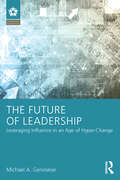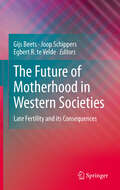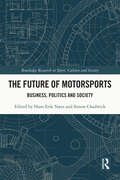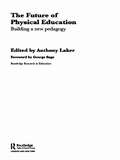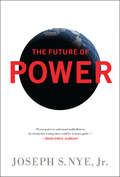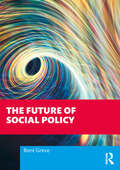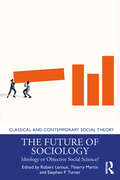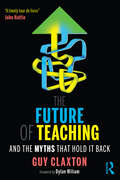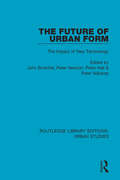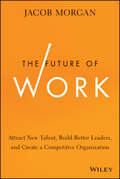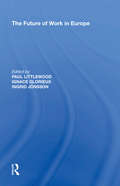- Table View
- List View
The Future of Judaism in America (Studies of Jews in Society #5)
by Mark Silk Jerome A. ChanesThis book explores the state of the American Jewish world in the early 21st century, after decades of accelerating change that has transformed it and all other religious groups in the United States. It reveals a community in an unparalleled state of flux grappling with a society in which religious identity is more and more considered an individual choice, rather than an inheritance, and where fewer adults feel impelled to identify with any religious tradition at all. In chapters written by leading experts, the book examines the community’s evolving demographics, the direction of the principal denominational movements, contemporary religious trends, interactions with other American religious communities and engagements in the country’s secular politics. This text uniquely covers all these aspects of Judaism in America making it appealing to students and researchers in such fields as the sociology of religion, Judaism, and American history.
The Future of Leadership: Leveraging Influence in an Age of Hyper-Change (Leadership: Research and Practice)
by Michael A GenoveseThe Future of Leadership considers how the rapid changes of today will affect the leaders of tomorrow. Renowned Leadership scholar Michael A. Genovese argues that one of the key challenges for future leaders will be to effectively and constructively manage the ‘hyper-change’ taking place both within organizations and in the broader social and political spheres. Taking a Futures Studies approach to envision the state of leadership in the coming decades, Genovese also provides case studies of leaders who have already demonstrated the mind- and skill-sets necessary to successfully manage rapid change.
The Future of Looking Back
by Richard BanksWhat will we leave behind in this new digital age? As digital technology takes an ever-increasing role in our lives, one question is how we'll manage our collections after we're gone. What takes the place of shoeboxes full of pictures and dog-eared record albums? Get an inside look at Microsoft researcher Richard Banks's thinking about how we might manage the digital artifacts and content we're creating now--and how we might pass on or inherit these kinds of items in the future. About the Microsoft Research Series At Microsoft Research, we're driven to imagine and to invent. Our desire is to create technology that helps people realize their full potential, and to advance the state of the art in computer science. The Microsoft Research series shares the insights of Microsoft researchers as they explore the new and the transformative.
The Future of Metaphysical Religion in America (Boundaries of Religious Freedom: Regulating Religion in Diverse Societies)
by Christopher White Mark SilkThis collection of essays by leading scholars explores the present, dynamic state of metaphysical religion in America. It includes chapters that: put survey data on this growing group in context; clarify definitional issues in the study of spirituality in general and metaphysical spirituality in particular; and assess the networks, conferences, rituals, festivals, retreat centers and periodicals recently developed by metaphysicals. The contributors discuss characteristic practices of mental healing and meditation, and show the reach of metaphysical ideas into public spaces and popular media cultures. One particular chapter also addresses the growing controversy over the legitimacy of metaphysical individuals and movements that appropriate elements of Native American and Asian religious beliefs and practices to enrich or sustain their own practice. This rich collection appeals to students, researchers, professionals and the layperson interested in knowing more about the history and more importantly the direction that American metaphysical religion is taking.
The Future of Motherhood in Western Societies
by Egbert R. te Velde Gijs Beets Joop SchippersMost people value to have children still highly. But what is the optimal moment to have the first? The decision on having children or not and if yes on the timing of the first is one of the most difficult ones to make, also because it more or less coincides with various other heavy decisions on shaping the life course (like on union formation, labour market career, housing accommodation, etc.). People realise that having children will fundamentally change their life and in order to fit this unknown and irreversible adventure perfectly into their life course postponement of the first birth is an easy way out as long as doubts continue and partners try to make up their mind. Modern methods of birth control are of course a very effective help in that period. What is the best moment to have the first child? And to what moment is postponement justified? There are no easy answers to these questions. Best solutions vary per person as they depend on personal circumstances and considerations (the partner may have conflicting ideas; housing accommodation; job; income; free time activities). Existing parental leave and child care arrangements are weighted as well. Unfortunately the biological clock ticks further. And, also unfortunately, assisted reproductive technology (IVF etc.) is unable to guarantee a successful outcome. Several couples end up without children involuntarily and that may lead to sorrow and grief. This interdisciplinary book overviews the process of postponement and its backgrounds in modern Western societies holistically, both at the personal and the societal level. Contributions come from reproductive, evolutionary biological and neurological sciences, as well as from demography, economy, sociology and psychology. It holds not only at women but also at men becoming first time fathers. The discussion boils down to a new policy approach for motherhood and emancipation on how to shape work and family life? It is argued that a public window where one can compose a 'cafeteria'-like set of supportive arrangements according to personal preferences could lead to a break in the rising age at first motherhood.
The Future of Motorsports: Business, Politics and Society (Routledge Research in Sport, Culture and Society)
by Simon Chadwick Hans Erik NæssThis book takes stock of the position of motorsport in the 21st century and considers how it will continue to influence sport business, politics, and society in the future. Presenting a set of thematic essays and multi-disciplinary case studies, the book demonstrates that motorsport continues to play a significant role in relationships between the automotive industry, nationalism, industrialisation, and capitalism as well as motorsports’ position as a feature of contemporary popular culture. Examining issues such as event management and legacy, environmental sustainability and ‘greenwashing’, diversity and inclusion, the rise of gaming and esports, and the use of sport as political soft power around the world across multiple motorsport disciplines, the book shines fascinating new light on this innovative but sometimes problematic industry. This is essential reading for all advanced students, researchers, managers, strategists, sponsors, and other stakeholders working at the nexus of motorsport, business, politics, and culture.
The Future of National Urban Policy
by Marshall KaplanThe Future of National Urban Policy brings together scholars, policymakers, and journalists to explore the condition of America's cities. The authors focus on policies of the previous five presidential administrations to examine the history of urban policy and offer suggestions for its future. Individual chapters address a variety of topics, including housing, employment, education, the infrastructure of cities, and public policy.
The Future of Physical Education: Building a New Pedagogy (Routledge Research in Education #Vol. 6)
by Anthony LakerAnthony Laker leads an outstanding international team of educational theorists in critically examining the theoretical underpinnings of physical education, and in challenging the rhetoric, the practices and the pedagogies that prevail in our schools. There has been a great deal of discussion surrounding the value of this subject in schools, particularly around the form that physical education should take. The domination of physical education teaching by the scientific / technical discourses is problemized and it is suggested that this domination limits the potential of the subject to be culturally and contextually relevant to students in schools. This edited collection aims to extend the worldwide academic debate of the future of physical education in schools by challenging the prevailing 'authorised curricula'.Each contributor address a key contemporary issue in physical education bringing different perspectives as they relate to the evolving issues of the subject. They ask important questions about where we intend to take the knowledge we have gained from a legacy of positive research. These chapters tackle critical issues in modernist physical education and suggest how a re-evaluation could contribute to the continuing advancement of the subject for more diverse educational benefits. Laker draws this body of work together in a conclusion that describes a theoretically and pedagogically innovative physical education curriculum for the 21st century.This book is a summary of the current state of research in physical education. It invites debate and discussions in the field and re-conceptualises physical education theory into inclusive practices located in the postmodern school world.
The Future of Power
by Joseph S. Nye JrThe influential policy thinker who coined the term osoft powerOCO examines the changing nature of power since the Cold War, the new ways in which it is exercised, and how those changes impact AmericaOCOs role in the world
The Future of Public Housing
by Mark Stephens Jie Chen Yanyun ManPublic housing was once an important strand in western housing policies, but is seldom seen as a mainstream policy instrument for the future. In contrast, in many East Asian countries large public housing programs are underway. Behind these generalizations, there are exceptions, too. By including perspectives of scholars from across the world, this book provides new insights into public housing in its various forms. It contains in-depth chapters on public housing in five East Asian countries and six Western countries, together with three comparative overview chapters.
The Future of Retail and Service Design: Sustainable, Phygital, and Community (Routledge Research in the Retail Industry)
by Katelijn Quartier Bethan Alexander Mia Münster Zakkiya Khan Francesca MurialdoThis book explores the future of retail and service design, offering cutting-edge insights from leading researchers. With a focus on sustainability, phygital innovation, and community retail, it provides a forward-thinking roadmap for the evolution of these fields.Each chapter examines the current landscape and future possibilities, presenting a dynamic vision of what lies ahead. From transforming customer experiences through community engagement and immersive technologies to advancing sustainability, this book invites readers to engage with emerging trends and the transformative power of design.Ideal for researchers, designers, educators, students, and innovation enthusiasts, it delivers fresh perspectives on the rapidly evolving world of retail and service design.Chapter 8 of this book is freely available as a downloadable Open Access PDF at http://www.taylorfrancis.com under a Creative Commons Attribution‑Non Commercial‑No Derivatives (CC‑BY‑NC‑ND) 4.0 license.
The Future of Social Policy
by Bent GreveThis book analyses trends and data relating to issues affecting social policy in mature welfare states in Europe, and uses these elements to further our understanding of, and ability to try to say something about, the future of social policy, its direction and content.Looking at the financial crisis of 2008, the refugee crisis in Europe, COVID-19, the climate crisis, ageing populations and the rise of artificial intelligence, it shows how these may also have an impact on future social policy, including what kind of social policy might be needed because of changes in living conditions across the continent.Written by one of Europe’s more prominent social policy experts, this book, the first of its kind, will be required reading for all scholars and students of social policy, social welfare, public policy, sociology and social work.
The Future of Sociology: Ideology or Objective Social Science? (Classical and Contemporary Social Theory)
by Stephen Turner Robert Leroux Thierry MartinThis book explores the shift in sociology away from the shared aspiration of the classical transition, of transcending partiality through the construction of a "science of society", in the face of challenges to the notion of objectivity. With the increasing subjugation of sociology to political ideologies and a growing emphasis on "policy", which casts sociology in the role of a provider of intellectual content for political programs, this volume asks whether the situation is the result of an exhaustion of ideas or might perhaps be rooted in the failure in the very program of establishing sociology as a science. Taking seriously the challenges to the classical aspiration of constructing theories that both explain and are grounded in empirical reality, The Future of Sociology asks whether the core idea of transcending ideology is still worth pursuing, and whether there remains scope for making sociology scientific. As such, it will appeal to scholars and students of sociology, social theory, and social scientific methodology.
The Future of Teaching: And the Myths That Hold It Back
by Guy ClaxtonIt’s time for the educational slugfest to stop. ‘Traditional’ and ‘progressive’ education are both caricatures, and bashing cartoon images of each other is unprofitable and unedifying. The search for a new model of education – one that is genuinely empowering for all young people – is serious and necessary. Some good progress has already been made, but teachers and school leaders are being held back by specious beliefs, false oppositions and the limited thinking of orthodoxy. Drawing on recent experience in England, North America and Australasia, but applicable round the world, The Future of Teaching clears away this logjam of bad science and slack thinking and frees up the stream of much-needed innovation. This timely book aims to banish arguments based on false claims about the brain and poor understanding of cognitive science, reclaim the nuanced middle ground of teaching that develops both rigorous knowledge and ‘character’, and lay the foundations for a 21st-century education worthy of the name.
The Future of Television: Cultural Trajectories of Media Consumption in the Digital Age of Emotion (Routledge Advances in Sociology)
by Abílio AlmeidaThe book is divided into two sections: one focusing on the phenomenon of television and the other on audiences. It argues that television is changing from a singular object, fixed in a particular place, to a social phenomenon distributed across many devices and platforms. It also argues that audiences are increasingly demanding an ‘open relationship’ with television, as their attention is often distributed across multiple devices and platforms simultaneously. In addition to these aspects, we analyse the evolution of television since its inception, the need for a renewed public service 2.0 in tune with our times, the increasing dominance of talk shows and infotainment, and the new power of television combined with artificial intelligence. These and many other topics are covered in this book, which will be of interest to television professionals, academics in sociology, media studies, and various other fields.
The Future of Trust
by Ros TaylorA revealing exploration into how trust defines our lives, how it can be won and lost, and what its future might look like, in this fascinating title in the Melville House's FUTURES series.In a society battered by economic, political, cultural and ecological collapse, where do we place our trust, now that it is more vital than ever for our survival? How has that trust – in our laws, our media, our governments – been lost, and how can it be won back? Examining the police, the rule of law, artificial intelligence, the 21st century city and social media, Ros Taylor imagines what life might be like in years to come if trust continues to erode.Have conspiracy theories permanently damaged our society? Will technological advances, which require more and more of our human selves, ultimately be rejected by future generations? And in a world fast approaching irreversible levels of ecological damage, how can we trust the custodians of these institutions to do the right thing – even as humanity faces catastrophe?
The Future of Union Organising
by Gregor GallWhile 'union organising' has developed over time and in many different environments, it has become apparent that a number of key problems have developed. Evaluating its efficacy in terms of union strategies, tactics, styles and resources, this title outlines a number of strategies for improving these deficiences.
The Future of Urban Form: The Impact of New Technology (Routledge Library Editions: Urban Studies #5)
by Peter Hall Peter Nijkamp Peter Newton John BrotchieThis book, first published in 1985, explores the ways in which the editors and contributors predicted the urban system, shaped by emerging technologies, would look like, both nationally and internationally. The technological changes covered include automation in the secondary sector, the effects of energy price rises and threats of shortage, and substitution effects in the energy and vehicle technology areas. Social and economic factors discussed include unemployment patterns, urban activities and lifestyles and their interactions. This title will be of interest to students of urban studies.
The Future of Welfare in a Global Europe
by Bernd MarinWhat is the future of welfare in Europe? The European welfare state is generally considered to be one of the finest achievements of the post-1945 world. Set up to eradicate poverty by providing a minimum standard of living and social safety net, the welfare state has come under increasing strain from ageing societies, growing unemployment, a deskilling society, and mass migration (both from inside and outside of Europe). With contribution from some of Europe's leading experts on this subject, this path-breaking volume highlights the internal and external pressures on the welfare state and asks whether any European welfare model is sustainable in the long term. This book will be of interest to all students, academics and professions working in the field of European social policy.
The Future of Whiteness
by Linda Martín AlcoffWhite identity is in ferment. White, European Americans living in the United States will soon share an unprecedented experience of slipping below 50% of the population. The impending demographic shifts are already felt in most urban centers and the effect is a national backlash of hyper-mobilized political, and sometimes violent, activism with a stated aim that is simultaneously vague and deadly clear: 'to take our country back.' Meanwhile the spectre of 'minority status' draws closer, and the material advantages of being born white are eroding. <p><p> This is the political and cultural reality tackled by Linda Martín Alcoff in The Future of Whiteness. She argues that whiteness is here to stay, at least for a while, but that half of whites have given up on ideas of white supremacy, and the shared public, material culture is more integrated than ever. More and more, whites are becoming aware of how they appear to non-whites, both at home and abroad, and this is having profound effects on white identity in North America. The young generation of whites today, as well as all those who follow, will have never known a country in which they could take white identity as the unchallenged default that dominates the political, economic and cultural leadership. Change is on the horizon, and the most important battleground is among white people themselves. <p><p> The Future of Whiteness makes no predictions but astutely analyzes the present reaction and evaluates the current signs of turmoil. Beautifully written and cogently argued, the book looks set to spark debate in the field and to illuminate an important area of racial politics.
The Future of Work
by Jacob MorganThroughout the history of business employees had to adapt to managers and managers had to adapt to organizations. In the future this is reversed with managers and organizations adapting to employees. <P><P>This means that in order to succeed and thrive organizations must rethink and challenge everything they know about work. The demographics of employees are changing and so are employee expectations, values, attitudes, and styles of working. <P><P> Conventional management models must be replaced with leadership approaches adapted to the future employee. <P><P>Organizations must also rethink their traditional structure, how they empower employees, and what they need to do to remain competitive in a rapidly changing world. <P><P>This is a book about how employees of the future will work, how managers will lead, and what organizations of the future will look like. <P><P>The Future of Work will help you: <br>Stay ahead of the competition <br>Create better leaders <br>Tap into the freelancer economy <br>Attract and retain top talent <br>Rethink management <br>Structure effective teams <br>Embrace flexible work environments <br>Adapt to the changing workforce <br>Build the organization of the future <br>And more <P> The book features uncommon examples and easy to understand concepts which will challenge and inspire you to work differently.
The Future of Work in Europe
by Ignace Glorieux Paul Littlewood Ingrid JonssonRecent years have witnessed major changes to the workplace across Europe. The speed of these changes requires constant monitoring and reappraisal. In this book, recent trends are analyzed and their consequences discussed, within a socio-historical context which also reveals underlying patterns of continuity. The trends analyzed include: � the presence of high rates of endemic unemployment and underemployment, particularly amongst the young � the growth of insecure and precarious employment � sweeping changes to the regulation of and organization of work � the diminution in the availability of manual work and the growth of white-collar service-sector jobs � the growing participation of women in paid employment � the introduction of new organizational forms and new forms of management � the accelerating use of IT � the growth in demand for educational and vocational qualifications by employers � the increasing influence of European legislation on work, retirement, health, safety, etc � the growing importance of voluntary-sector work The contributors to the volume present both primary research and a wide-ranging survey and analysis of recent major contributions in the field. Detailed empirical material is included from Belgium, Finland, Germany, The Netherlands, Spain, Sweden, the UK and the EU more generally. Thus, the book aims to provide a current overview of the nature of work from a pan-European perspective, illuminated by up-to-the-minute field research.
The Future of Work in the United States: Discourses on Automation and the Platform Economy (Contributions to Economics)
by Natalie RauscherThis book presents and analyzes how restructuring processes due to technological change are reflected and processed in political and public discourses in the United States in the most recent past. More specifically, this work examines how the themes of automation, digitization, and the platform economy and their impact on the future of work are reflected in public discourse through the analysis of journalistic articles, and political discourse through the analysis of congressional hearings. Public and political discourses, as well as economic narratives, shape our understanding of certain developments such as technological change, our behavior more generally, and societal support of said developments. Therefore, it is vital to investigate and analyze these discourses in order to show how technological change is perceived and evaluated today. This work draws from concepts and methods of several different disciplines, most notably using a combination of corpus-linguistic methods and exemplary textual analysis. This way, this work stands as truly interdisciplinary, with a unique approach to the quantitative and qualitative examination of discourses.
The Future of Workplace Fear: How Human Reflex Stands in the Way of Digital Transformation
by Steve PrenticePeople who discuss digital transformation often focus on new technology with a presumption that the working population will embrace it enthusiastically. But human beings are still instinctively dominated by fear, a single complicating reflex which will always be the default response.Workplace fear comes in many forms, including the fear of change, the fear of looking stupid, and the fear of working relationships, and in all cases these fears have deep roots that extend far below having to learn a new technology. It’s about the fear of losing a job, a livelihood, and an identity.The results of such fear can have enormous repercussions on an organization, including increased vulnerability to ransomware and cyberattack, increased employee turnover, loss of competitiveness, loss of market share, resistance, sabotage, discrimination, and litigation.Steve Prentice is an expert in the relationship between people, technology, and change. This book will demonstrate to managers and employees alike the various types of fear that can occur in the workplace in the context of digital transformation, how these fears can impact productivity, team dynamics, and corporate health, and most importantly, how to overcome them.Using case studies of digital transformation successes and failures, Steve describes:How fear grows in the body and mindHow fear radiates and spreads through groups and teamsHow fear interacts with technology, change, and digital transformationHow ignoring or suppressing fear leads to tangible risks to an organization’s futureHow to address and manage fear individually and as a groupHow the demands of modern employees have changedHow managers can prepare themselves for the new normalWho This Book Is For Managers who wish to look under the hood and understand how people respond to the changes in their immediate world, and why most of those responses are negative. It will also be an uplifting read for individual employees who seek to understand why they, or their colleagues or managers, generally respond negatively to changes, or who struggle with conflict and relationships in the workplace and how to create an action plan to improve the situation.
The Future of the Gulf Region: Value Change and Global Cycles (Gulf Studies #2)
by Arno TauschThis book studies values and attitudes in the Gulf region. In light of global power shifts, the threatening collapse of internal security in the West, and uncertainty about the current leadership vacuum in world society, this book explores a future leading role of the Gulf countries in such institutions as the G-20 and the OECD. Based on rigorous analysis of macro-level data and opinion surveys with relevance for the Gulf region, it analyzes the global macro-factors shaping the Gulf's future at a time of the global COVID-19 crisis and depression and rising global tensions. Starting with an empirical time series analysis of the long cycles of global politics and economics, it highlights the implications for the Gulf region. Offering a multivariate analysis of civil society values in the Gulf, the author analyzes value changes and attitudes on antisemitism, political Islam, internal security, democracy, and other issues of Arab politics. The partially optimistic conclusions of the study testify to the underestimated and incipient maturity of the Gulf’s civil society and strongly suggest that the Gulf's future is rather with the free societies of the West and not with a Neo-Ottoman Empire in whatever form."Exceptional in scope and right up-to-the-minute in coverage"Brian M Pollins, Associate, Professor Emeritus, The Ohio State University."An outstanding and topical book by an astute scholar of the MENA region"Professor Hussein Solomon, Academic Head of Department, Political Studies and Governance, University of the Free State, South Africa."The most comprehensive and insightful study on the subject to date"Manfred B. Steger, Professor of Sociology, University of Hawai'i at Manoa and Global Professorial Fellow, Western Sydney University.

